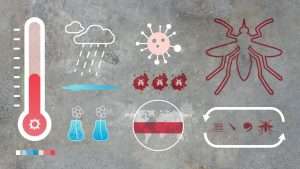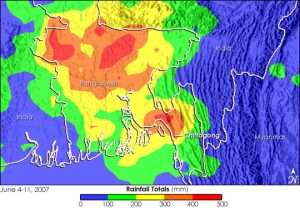Climate Change Exacerbates Dengue Outbreaks in South Asia

In South Asia, the battle against mosquito-borne dengue fever has intensified in recent years, with Bangladesh experiencing a record number of deaths and Nepal witnessing the spread of cases into new areas. The culprits? Rising temperatures and prolonged monsoon seasons, both exacerbated by the ominous specter of climate change. As authorities in these nations grapple with the alarming surge in dengue cases, experts warn of the looming threat posed by this “breakbone fever,” named for the excruciating muscle and joint pains it inflicts.
Bangladesh: A Grim Milestone
The situation in Bangladesh has reached a grim milestone in 2023, with official figures reporting at least 691 deaths and over 138,000 infections, marking the deadliest year since the first recorded epidemic in 2000. The previous record, a mere 281 deaths, was set just last year. This alarming surge can be attributed in part to the widespread distribution of the dengue-carrying Aedes aegypti mosquito, which has now infiltrated almost every corner of the country.
Kabirul Bashar, an entomologist and zoology professor at Jahangirnagar University in the capital city, Dhaka, highlights the heightened risk of infections during September, coinciding with the monsoon season, when stagnant water becomes an ideal breeding ground for mosquitoes. According to Bashar, “This climate is favorable for the breeding of Aedes mosquitoes,” and he adds that dengue is no longer confined to Dhaka; it’s now a nationwide problem.
Nepal’s Unprecedented Challenge
Nepal, which first reported dengue cases in 2004, is facing a new and unexpected challenge. In 2023, the country has already recorded at least 13 dengue-related deaths and more than 21,200 cases across 75 of its 77 districts. These figures are eerily reminiscent of 2022 when the nation grappled with 88 deaths and 54,000 cases.
Uttam Koirala, a senior public health officer at the national epidemiology and disease control division, raises concerns that the current year may match the previous one’s toll. What makes this situation even more perplexing is the emergence of dengue in colder autumn months and its spread to Nepal’s higher mountain districts, previously untouched by the disease. The city of Dharan, nestled in the mountainous east, exemplifies this phenomenon. Dengue cases there have surged at an unprecedented rate, overwhelming local hospitals and ambulances with an alarming peak of 1,700 cases a day as of late August.
Amrit Kumar Thakur, a resident of Dharan and a dengue survivor, describes the ordeal as “the worst health experience of my life.” Thakur’s story sheds light on the gravity of the situation, underscoring the urgent need for effective interventions.
Climate Change: A Driving Force
The World Health Organization (WHO) has sounded the alarm, attributing the global rise in dengue cases in part to the favorable conditions created by global warming for mosquito breeding. Other contributing factors include increased human mobility, urbanization, and sanitation challenges. In July, the WHO identified an unusual spike in rainfall in Bangladesh, coupled with high temperatures and humidity, as significant drivers behind the rapid proliferation of mosquitoes.

Furthermore, Bangladesh has experienced extended monsoon seasons in recent years, leading to erratic rainfall from March to October and the creation of more mosquito breeding grounds, according to experts in disease and health. Fiercer floods, fueled by heavy rains and melting glaciers driven by climate change, also play a substantial role in the dengue epidemic.
Saber Hossain Chowdhury, the prime minister’s special envoy on climate change, emphasized the interconnectedness of climate change and health. He underscored the need for a national plan in Bangladesh to adapt its health system to confront diseases like dengue more effectively.
Prevention and Awareness
In the absence of a specific cure for dengue, authorities and health experts emphasize the importance of mosquito control, public engagement, and symptom management. In Dhaka, officials are intensively spraying insecticides across the city while imposing fines for breeding site negligence. The battle against dengue is a year-round endeavor, requiring consistent public awareness campaigns and vigilant monitoring.

In Nepal, the challenge is more complex, with mosquitoes found in diverse locations, from garages to remote corners of houses. Dhimal from the Nepal Health Research Council urges collective awareness and proactive contributions from individuals to control the vector’s spread. Civil society and development organizations are also lending a hand by raising public awareness, procuring testing kits, and increasing the availability of platelets for blood transfusions.
However, the financial burden remains a substantial hurdle for many families. Researchers from Dhaka University’s Institute of Health Economics estimate that total medical expenses for dengue patients may exceed 10 billion taka ($91 million) in 2023, up from 4.5 billion taka ($41 million) in 2019. Ordinary families like that of Akhtar Hossain, who lost his daughter to dengue, bear the brunt of these costs, highlighting the need for comprehensive healthcare solutions.
In the face of this mounting crisis, the battle against dengue in South Asia continues. While climate change exacerbates the problem, concerted efforts in prevention, awareness, and healthcare can provide a path forward in this ongoing struggle against “breakbone fever.”
Hope you loved reading our blog on Climate Change Exacerbates Dengue Outbreaks in South Asia
Do Follow Us On Twitter – https://twitter.com/Uniqverses708
We Have a Wide Range of Unique information For You On Uniqverses.com
Please like, comment & Share if you want us to keep bringing these amazing and unique information for you.








